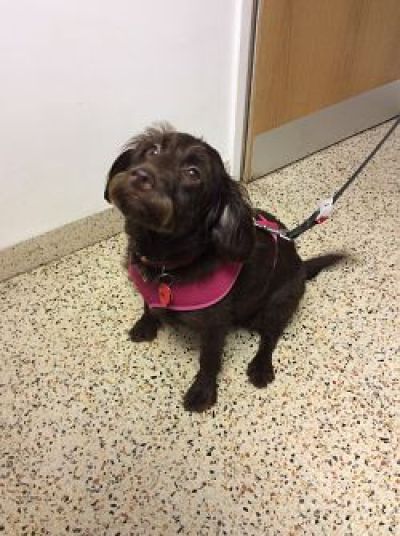
Posted By:
One of the most common problems seen at the practice is vomiting and diarrhoea. Often these will resolve fairly quickly, in a number of days. However in some cases they can persist longer, and then further investigation is needed to find out what is causing the problem.
One such case was Indy, a lovely 6 year old crossbreed dog. She presented with vomiting and diarrhoea, and was given a bland diet and anti-sickness medication but her problems persisted. Blood tests and x-rays were taken, and at this stage both of these showed no abnormalities. Eventually over the next couple of weeks, things started to improve. However, a few months later she was still having intestinal problems.
Although she was no longer vomiting she was now struggling to go to the toilet. At this time a firm area was felt in her abdomen which had not been there previously. The toileting problems continued for the next few weeks and when we re-examined her, she was becoming uncomfortable in her abdomen as well. At this point we were worried whether the firm area was a mass so we decided to get her into the practice to take some x-rays again. These showed that thankfully no mass was present. However there was a very large build up of faeces in her large intestine, much more than would be expected from normal constipation.
Indy was found to have a condition called megacolon. This is where the large intestine becomes very enlarged. As well as this the gut also has reduced movement, meaning that things do not pass through as rapidly as they should do. The cause of this condition is not known. It is also much more common in cats and rarely seen in dogs so it was not what we were expecting to find in Indy! Surgery can be performed in cats to remove their large intestine. However this surgery is not usually successful in dogs and can lead to many more complications than it can cure. This meant that we have had to manage her condition medically. It is not a condition that we can cure, but one that will need ongoing management.
We gave her an enema and removed the bulk that had built up to give her some relief. Indy was started on a medication to improve her gut movement and a diet which helps to do the same. We knew we would have to perform more enemas to manage the condition, and she had a number of them over the next few weeks to clear the build up which kept returning. We eventually manage to get to a point where we only had to do them every 2 months. However she started becoming more painful again, and we had to increase the frequency of enemas to every few weeks. The sedation needed to do them was making her sleepy for a day or two afterwards and it was starting to effect her quality of life. We had to think of a new strategy. We started her on a different medication to get her intestines moving, one which had only recently become available again. This has made a huge difference to Indy. She has turned a corner and it has now been 4 months since her last enema. She is bright, bouncy, eating well, going to the toilet fairly normally and a very happy dog. Indy will need to be managed with these medications, most likely for the rest of her life, but we couldn’t be happier to see her doing so well, and the fewer enemas she needs the better!
As our feline friends get older there are a few conditions...
Another winter discussion group season is now behind...
We used a client’s new Morris Remote Control...
Itchy and sore skin is a common issue amongst our...
©2024 Shepton Veterinary Group Ltd., All rights reserved.
Privacy Policy • Terms & Conditions • Cookie Policy